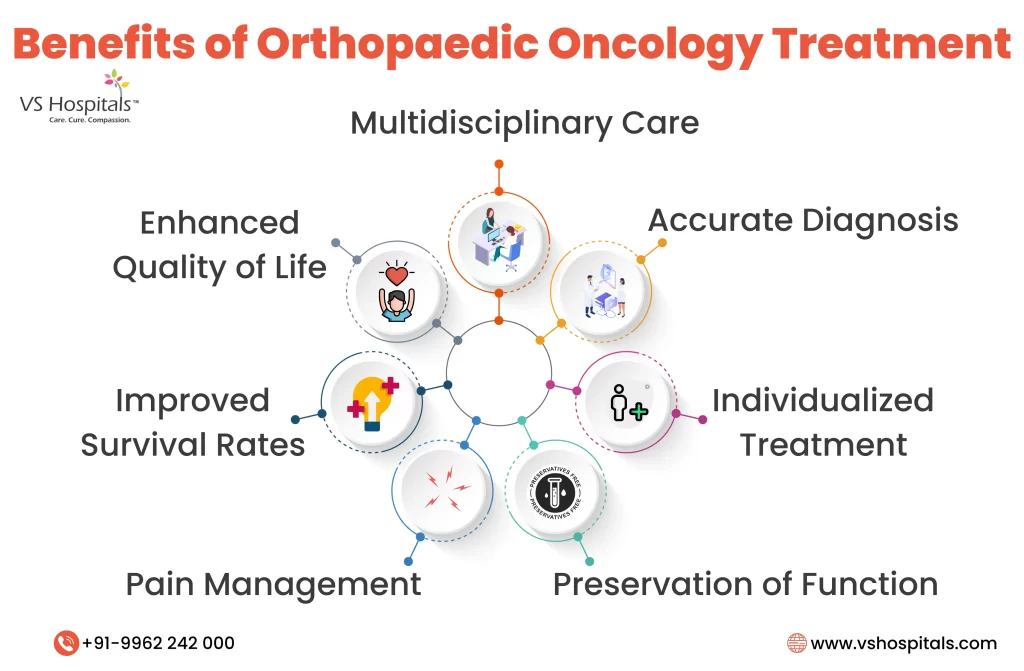Orthopaedic oncology is a specialized branch of orthopaedics that deals with the diagnosis and treatment of bone and soft tissue tumors, both benign and malignant. Early detection is critical in orthopaedic oncology treatment in Chennai as it has a greater chance of successful treatment and cure. In this article, we will discuss the importance of early detection in orthopaedic oncology treatment.
Cancer Screening for Orthopaedic Oncology Treatment in Chennai
To maintain good health, it is essential to take a proactive approach and seek medical attention if any symptoms or concerns arise. Your doctor may recommend various cancer screening tests during the orthopaedic oncology treatment in Chennai, including:
- Mammogram to detect changes or abnormalities indicating breast cancer.
- Pap smear to identify abnormal cells on the cervix that could indicate cervical cancer.
- Colonoscopy to examine the inside of the colon and rectum for precancerous polyps.
- Prostate-specific antigen (PSA) test to measure the level of PSA, a protein produced by the prostate gland to indicate prostate cancer.
- Liver function tests measure the levels of certain enzymes and proteins produced by the liver to detect liver cancer.
- Endoscopy to examine the inside of the oesophagus, stomach, and small intestine for signs of cancer.
- Chest X-rays by orthopaedic oncologist in Chennai help detect changes or abnormalities to indicate lung cancer.

Importance of Early Detection in Cancer Care
Better Prognosis
Early detection of bone and soft tissue tumors is critical to achieving a better prognosis for patients. This is because early-stage tumors are generally smaller, less aggressive, and easier to remove completely with surgery. In contrast, advanced-stage tumors are often larger, more aggressive, and may have already metastasized to other parts of the body, making treatment more challenging and reducing the chances of a favorable outcome.
More Conservative Treatment Options
Early orthopaedic oncology treatment in Chennai provides patients with a greater range of conservative treatment options which can be used alone or in combination with surgery. When a tumor is detected early, it may be small enough that conservative treatments alone are sufficient to eradicate the cancer. In contrast, advanced-stage tumors may require more aggressive treatment.
Reduced Risk of Amputation
One of the most significant advantages of early detection in orthopaedic oncology is the reduced risk of amputation. If a tumor is detected early, it may be possible to remove it with surgery while preserving the affected limb. This is particularly important in children and young adults, who may be at risk of lifelong disability and reduced quality of life if they undergo limb amputation.
Increased Quality of Life
The orthopaedic oncology treatment in Chennai can significantly improve patient’s quality of life. This is because early treatment reduces the risk of complications and reduces the need for aggressive treatments that can cause pain, discomfort, and long-term disability. Additionally, early detection allows for early intervention, which can reduce the overall length of treatment and shorten recovery time.
Reduced Cost of Treatment
Detecting at the initial stage of bone and soft tissue tumors can also reduce the overall cost of treatment. When tumors are detected early, they are typically smaller and less aggressive, which means they require less extensive treatment. This, in turn, can lead to lower treatment costs and reduced healthcare expenses.
Improved Surgical Outcomes
Detecting bone and soft tissue tumors at an early stage of orthopaedic oncology treatment in Chennai improves surgical outcomes. When a tumor is detected early, it may be possible to remove it with a smaller incision and preserve more healthy tissue. This can reduce the risk of complications, improve patient recovery, and reduce the overall length of hospital stays.
Screening for High-Risk Patients
Particularly, early detection of bone and soft tissue tumors is important for patients who are at high risk, such as those with a family history of cancer, patients with certain genetic syndromes, and patients who have undergone radiation therapy. For these patients, regular screening and surveillance by orthopaedic oncologist in Chennai can help detect tumors early and improve overall treatment outcomes.
Benefits of Orthopaedic Oncology
Orthopaedic oncology, specializing in the diagnosis and treatment of bone and soft tissue tumors, offers several benefits:
- Early Detection: Enables early identification of tumors, enhancing treatment options.
- Comprehensive Treatment: Provides personalized, multidisciplinary care plans.
- Limb-Sparing Surgery: Aims to preserve limbs when possible, maintaining function and quality of life.
- Advanced Therapies: Access to cutting-edge treatments, including targeted therapies and immunotherapy.
- Reconstruction: Expertise in reconstructive surgery for improved post-treatment functionality and aesthetics.
Orthopaedic oncology ensures thorough, specialized care for patients with musculoskeletal tumors.
Common Conditions/Diseases in Orthopaedic Oncology
Orthopedic cancers affect bones and soft tissues, often spreading from other body parts. Key types include:
- Soft Tissue Sarcoma: Develops in muscles, fat, blood vessels, nerves, tendons, and ligaments, including liposarcoma, leiomyosarcoma, and synovial sarcoma.
- Bone Sarcoma: Rare cancer affecting the pelvis or long bones. Types include:
- Osteosarcoma: Affects children/adolescents.
- Chondrosarcoma: Arises from cartilage cells, common in adults.
- Ewing’s Sarcoma: Affects long bones and pelvis, mainly in young adults and children.
- Metastatic Bone Disease: Cancer spreading to bones from other sites.
- Multiple Myeloma: Impacts plasma cells in bone marrow, causing bone pain and fractures.
Causes
Studies indicate that many bone cancer cases are neglected, leading to delayed presentation, especially among individuals with low socioeconomic status, limited education, and poor access to healthcare facilities. Initial visits to traditional bone setters and misdiagnoses further exacerbate this issue. Despite this negligence, the exact cause of bone cancer remains unclear. However, significant risk factors for bone cancers include:
- Previous exposure to radiation therapy
- Genetic predisposition
- Compromised immunity or immune system abnormalities
- Lymphedema
- Exposure to harmful chemicals
For comprehensive Orthopaedic Oncology Treatment in Chennai, it’s essential to address these risk factors and ensure timely diagnosis and intervention to improve patient outcomes.
Conclusion
Early detection is critical for orthopaedic oncology treatment in Chennai. Additionally, it can improve patient’s quality of life for high-risk patients. Therefore, patients should be encouraged to seek medical attention promptly if they experience any unusual symptoms or have concerns about their health.
Read also Best Surgical Oncologist in India.




